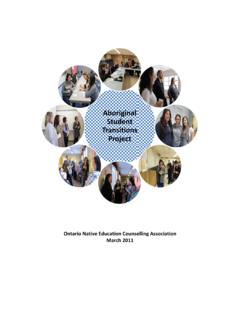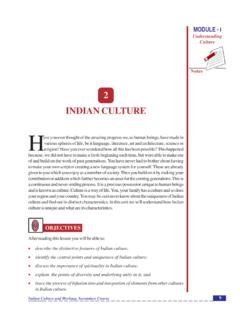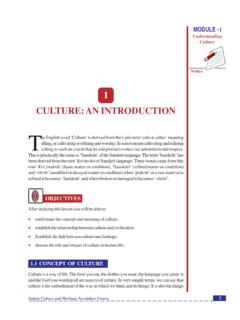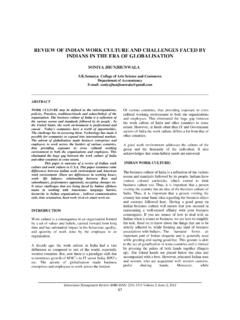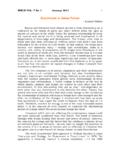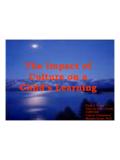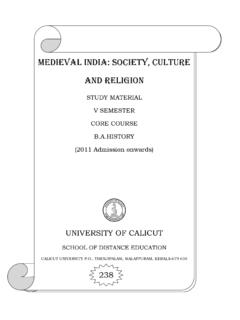Transcription of STATEMENT OF THE INDIAN - Home - ONECA
1 I INDIAN CONTROL OF INDIAN EDUCATION Policy Paper PRESENTED TO THE Minister of INDIAN Affairs and Northern Development BY THE National INDIAN Brotherhood/ Assembly of First Nations ii 1972 by National INDIAN Brotherhood/ Assembly of First Nations ALL RIGHTS RESERVED. THIS BOOK OR ANY PART THEREOF MAY NOT BE REPRODUCED WITHOUT THE WRITTEN PREMISSION OF THE ASSEMBLY OF FIRST NATIONS First Printing 1973 Second Printing 1976 Third Printing 2001 Additional copies of this book are available from: ASSEMBLY OF FIRST NATIONS 1 NICHOLAS STREET, SUITE 1002 OTTAWA, ONTARIO K1N 7B7 613-241-6789 (Telephone) website: iii PREFACE This STATEMENT on Education has been prepared for the Working Committee of the Negotiating Committee of the National INDIAN Brotherhood to be used as a basis for future common action in the area of education.
2 The issues which have been considered were designated by the Special Committee of the Executive Council of the National INDIAN Brotherhood, at Yellowknife, , May 17, 1972. This STATEMENT has been compiled from provincial and territorial associations' papers or statements on education, and from discussions of representatives of the associations at the Education Workshop, June, 1972. It is a STATEMENT of the: philosophy, goals, principles, and directions which must form the foundation of any school program for INDIAN children. In August, 1972, the General Assembly of the National INDIAN Brotherhood accepted the policy in principle, subject to certain additions. The final draft was approved by the Executive Council, November, 1972. It was presented to the Minister of INDIAN Affairs and Northern Development on December 21,1972. In a letter to the President of the National INDIAN Brotherhood, dated February 2,1973, the Minister gave official recognition to INDIAN CONTROL OF INDIAN EDUCATION, approving its proposals and committing the Department of INDIAN Affairs and Northern Development to implementing them.
3 Iv ACKNOWLEDGEMENTS This paper is based on the many statements prepared on behalf of, the Chiefs and Band Councils by the Education Directors of the provincial and territorial INDIAN organizations over the past years. Acknowledgement is made of the important contribution which the Education Directors have made to this joint policy STATEMENT . Thanks are also due to the National INDIAN Brotherhood's Education Committee which worked to find the common denominators in all of the provincial statements. Members of this Committee are: John Knockwood and Peter Christmas UNION OF NOVA SCOTIA indians Barry Nicholas UNION OF NEW BRUNSWICK indians Larry Bisonette, representing indians OF QUEBEC ASSOCIATION Louis Debassige and Roland Chrisjohn UNION OF ONTARIO indians Verna Kirkness MANITOBA INDIAN BROTHERHOOD Rodney Soonias FEDERATION OF SASKATCHEWAN indians Clive Linklater INDIAN ASSOCIATION OFALBERTA Teddy Joe and William Mussell UNION OF BRITISH COLUMBIA INDIAN CHIEFS David Joe YUKON NATIVE BROTHERHOOD v James Wah-shee INDIAN BROTHERHOOD OF THE NORTHWEST TERRITORIES Dr.
4 Jacqueline Weitz NATIONAL INDIAN BROTHERHOOD A special word of thanks is offered to them for their persistence and patience in correcting the several draft copies which preceded this final approved paper. On behalf of all, I wish to extend particular thanks to Dr. Weitz for her excellent co-ordination of the work, meetings and editing of this history-making document. And finally, the initiative of the Executive Council in launching this endeavor deserves public recognition. George Manuel, President National INDIAN Brotherhood. Ottawa, Ontario December, 1972 vi TABLE OF CONTENTS iii iv INDIAN PHILOSOPHY OF 1 STATEMENT OF 2 ROLE OF 3 5 FEDERAL 5 LOCAL 6 REPRESENTATION ON PROVINCIAL/TERRITORIAL SCHOOL 7 9 CURRICULUM AND INDIAN 9 Nursery Schools and 11 Junior and Senior High 11 Vocational 12 Adult 12 Post-Secondary 13 Alcohol and Drug 14 LANGUAGE OF 14 CULTURAL EDUCATION 16 vii 18 TRAINING PROGRAMS FOR TEACHERS AND 18 Native Teachers and 18 Non- INDIAN Teachers and 19 INDIAN 20 FACILITIES AND 21 SUB-STANDARD EDUCATIONAL 21 NEW EDUCATIONAL 21 EDUCATIONAL 21 21 Day 22 Group Homes 23 Denominational 23 24 24 PROBLEMS OF 25 SUMMARY OF INDIAN POSITION ON 27 CONCLUDING 32 33 1 STATEMENT OF THE INDIAN PHILOSOPHY OF EDUCATION In
5 INDIAN tradition each adult is personally responsible for each child, to see that he learns all he needs to know in order to live a good life. As our fathers had a clear idea of what made a good man and a good life in their society, so we modern indians , want our children to learn that happiness and satisfaction come from: pride in one's self, understanding one's fellowmen, and, living in harmony with nature. These are lessons which are necessary for survival in this twentieth century. Pride encourages us to recognize and use our talents, as well as to master the skills needed to make a living. Understanding our fellowmen will enable us to meet other Canadians on an equal footing, respecting cultural differences while pooling resources for the common good. Living in harmony with nature will insure preservation of the balance between man and his environment which is necessary for the future of our planet, as well as for fostering the climate in which INDIAN Wisdom has always flourished.
6 We want education to give our children the knowledge to understand and be proud of themselves and the knowledge to understand the world around them. 2 STATEMENT OF VALUES We want education to provide the setting in which our children can develop the fundamental attitudes and values which have an honored place in INDIAN tradition and culture. The values which we want to pass on to our children, values which make our people a great race, are not written in any book. They are found in our history, in our legends and in the culture. We believe that if an INDIAN child is fully aware of the important INDIAN values he will have reason to be proud of our race and of himself as an INDIAN . We want the behavior of our children to be shaped by those values which are most esteemed in our culture. When our children come to school they have already developed certain attitudes and habits which are based on experiences in the family.
7 School programs which are influenced by these values respect cultural priority and are an extension of the education which parents give children from their first years. These early lessons emphasize attitudes of: - self-reliance, - respect for persona freedom, - generosity, - respect for nature, - wisdom. All of these have a special place in the INDIAN way of life. While these values can be understood and interpreted in different ways by different cultures, it is very important that INDIAN children have a chance to develop a value system which is compatible with INDIAN culture. The gap between our people and those who have chosen, often gladly, to join us as residents of this beautiful and bountiful country, is vast when it comes to mutual understanding and appreciation of differences. To overcome this, it is essential that Canadian children of every racial origin have the opportunity during their school days to learn about the history, customs and culture of this country's original inhabitants and first citizens.
8 We propose that education authorities, especially those in Ministries of Education, should provide for this in the curricula and texts which are chosen for use in Canadian schools. 3 THE ROLE OF PARENTS IN SETTING GOALS If we are to avoid the conflict of values which in the past has led to withdrawal and failure, INDIAN parents must have control of education with the responsibility of setting goals. What we want for our children can be summarized very briefly: - to reinforce their INDIAN identity, - to provide the training necessary for making a good living in modern society. We are the best judges of the kind of school programs which can contribute to these goals without causing damage to the child. We must, therefore, reclaim our right to direct the education of our children. Based on two education principles recognized in Canadian society: Parental Responsibility and Local Control of Education, INDIAN parents seek participation and partnership with the Federal Government, whose legal responsibility for INDIAN education is set by the treaties and the INDIAN Act.
9 While we assert that only INDIAN people can develop a suitable philosophy of education based on INDIAN values adapted to modern living, we also strongly maintain that it is the financial responsibility of the Federal Government to provide education of all types and all levels to all status INDIAN people, whether living on or off reserves. It will be essential to the realization of this objective that representatives of the INDIAN people, in close cooperation with officials of the Department of INDIAN Affairs, establish the needs and priorities of local communities in relation to the funds which may be available through government sources. The time has come for a radical change in INDIAN education. Our aim is to make education relevant to the philosophy and needs of the INDIAN people. We want education to give our children a strong sense of identity, with confidence in their personal worth and ability.
10 We believe in education: - as a preparation for total living, - as a means of free choice of where to live and work, - as a means of enabling us to participate fully in our own social, economic, political and educational advancement. 4 We do not regard the educational process as an "either-or" operation. We must have the freedom to choose among many options and alternatives. Decisions on specific issues can be made only in the context of local control of education. We uphold the right of the INDIAN Bands to make these specific decisions and to exercise their full responsibility in providing the best possible education for our children. Our concern for education is directed to four areas which require attention and improvement: , responsibility, programs, teachers and facilities. The following pages will offer in an objective way, the general principles and guidelines which can be applied to specific problems in these areas.
